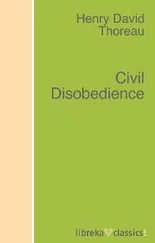Henry David Thoreau
WALDEN AND ON THE DUTY OF CIVIL DISOBEDIENCE
Dieses ebook wurde erstellt bei

Inhaltsverzeichnis
Titel Henry David Thoreau WALDEN AND ON THE DUTY OF CIVIL DISOBEDIENCE Dieses ebook wurde erstellt bei
Economy
“The evil that men do lives after them.”
COMPLEMENTAL VERSES
Where I Lived, and What I Lived For
Reading
Sounds
Solitude
Visitors
The Bean-Field
The Village
The Ponds
Baker Farm
Higher Laws
Brute Neighbors
Former Inhabitants and Winter Visitors
Winter Animals
The Pond in Winter
Walden pond map
Spring
Conclusion
ON THE DUTY OF CIVIL DISOBEDIENCE
Impressum neobooks
WALDEN
and
ON THE DUTY OF CIVIL DISOBEDIENCE
by Henry David Thoreau
When I wrote the following pages, or rather the bulk of them, I lived
alone, in the woods, a mile from any neighbor, in a house which I had
built myself, on the shore of Walden Pond, in Concord, Massachusetts,
and earned my living by the labor of my hands only. I lived there two
years and two months. At present I am a sojourner in civilized life
again.
I should not obtrude my affairs so much on the notice of my readers if
very particular inquiries had not been made by my townsmen concerning
my mode of life, which some would call impertinent, though they do not
appear to me at all impertinent, but, considering the circumstances,
very natural and pertinent. Some have asked what I got to eat; if I did
not feel lonesome; if I was not afraid; and the like. Others have been
curious to learn what portion of my income I devoted to charitable
purposes; and some, who have large families, how many poor children I
maintained. I will therefore ask those of my readers who feel no
particular interest in me to pardon me if I undertake to answer some of
these questions in this book. In most books, the _I_, or first person,
is omitted; in this it will be retained; that, in respect to egotism,
is the main difference. We commonly do not remember that it is, after
all, always the first person that is speaking. I should not talk so
much about myself if there were anybody else whom I knew as well.
Unfortunately, I am confined to this theme by the narrowness of my
experience. Moreover, I, on my side, require of every writer, first or
last, a simple and sincere account of his own life, and not merely what
he has heard of other men’s lives; some such account as he would send
to his kindred from a distant land; for if he has lived sincerely, it
must have been in a distant land to me. Perhaps these pages are more
particularly addressed to poor students. As for the rest of my readers,
they will accept such portions as apply to them. I trust that none will
stretch the seams in putting on the coat, for it may do good service to
him whom it fits.
I would fain say something, not so much concerning the Chinese and
Sandwich Islanders as you who read these pages, who are said to live in
New England; something about your condition, especially your outward
condition or circumstances in this world, in this town, what it is,
whether it is necessary that it be as bad as it is, whether it cannot
be improved as well as not. I have travelled a good deal in Concord;
and everywhere, in shops, and offices, and fields, the inhabitants have
appeared to me to be doing penance in a thousand remarkable ways. What
I have heard of Brahmins sitting exposed to four fires and looking in
the face of the sun; or hanging suspended, with their heads downward,
over flames; or looking at the heavens over their shoulders “until it
becomes impossible for them to resume their natural position, while
from the twist of the neck nothing but liquids can pass into the
stomach;” or dwelling, chained for life, at the foot of a tree; or
measuring with their bodies, like caterpillars, the breadth of vast
empires; or standing on one leg on the tops of pillars,—even these
forms of conscious penance are hardly more incredible and astonishing
than the scenes which I daily witness. The twelve labors of Hercules
were trifling in comparison with those which my neighbors have
undertaken; for they were only twelve, and had an end; but I could
never see that these men slew or captured any monster or finished any
labor. They have no friend Iolas to burn with a hot iron the root of
the hydra’s head, but as soon as one head is crushed, two spring up.
I see young men, my townsmen, whose misfortune it is to have inherited
farms, houses, barns, cattle, and farming tools; for these are more
easily acquired than got rid of. Better if they had been born in the
open pasture and suckled by a wolf, that they might have seen with
clearer eyes what field they were called to labor in. Who made them
serfs of the soil? Why should they eat their sixty acres, when man is
condemned to eat only his peck of dirt? Why should they begin digging
their graves as soon as they are born? They have got to live a man’s
life, pushing all these things before them, and get on as well as they
can. How many a poor immortal soul have I met well nigh crushed and
smothered under its load, creeping down the road of life, pushing
before it a barn seventy-five feet by forty, its Augean stables never
cleansed, and one hundred acres of land, tillage, mowing, pasture, and
wood-lot! The portionless, who struggle with no such unnecessary
inherited encumbrances, find it labor enough to subdue and cultivate a
few cubic feet of flesh.
But men labor under a mistake. The better part of the man is soon
plowed into the soil for compost. By a seeming fate, commonly called
necessity, they are employed, as it says in an old book, laying up
treasures which moth and rust will corrupt and thieves break through
and steal. It is a fool’s life, as they will find when they get to the
end of it, if not before. It is said that Deucalion and Pyrrha created
men by throwing stones over their heads behind them:—
Inde genus durum sumus, experiensque laborum,
Et documenta damus quâ simus origine nati.
Or, as Raleigh rhymes it in his sonorous way,—
“From thence our kind hard-hearted is, enduring pain and care,
Approving that our bodies of a stony nature are.”
So much for a blind obedience to a blundering oracle, throwing the
stones over their heads behind them, and not seeing where they fell.
Most men, even in this comparatively free country, through mere
ignorance and mistake, are so occupied with the factitious cares and
superfluously coarse labors of life that its finer fruits cannot be
plucked by them. Their fingers, from excessive toil, are too clumsy and
tremble too much for that. Actually, the laboring man has not leisure
for a true integrity day by day; he cannot afford to sustain the
manliest relations to men; his labor would be depreciated in the
market. He has no time to be anything but a machine. How can he
remember well his ignorance—which his growth requires—who has so often
to use his knowledge? We should feed and clothe him gratuitously
sometimes, and recruit him with our cordials, before we judge of him.
Читать дальше













